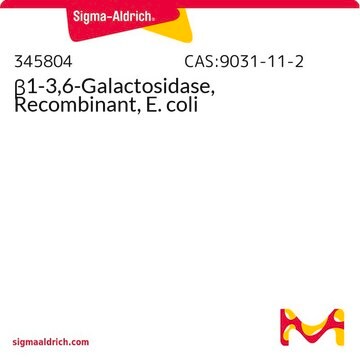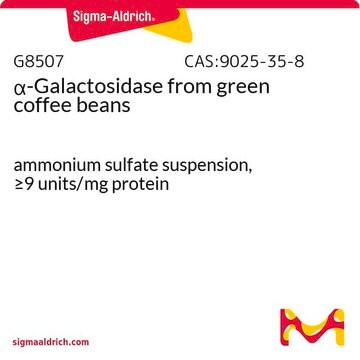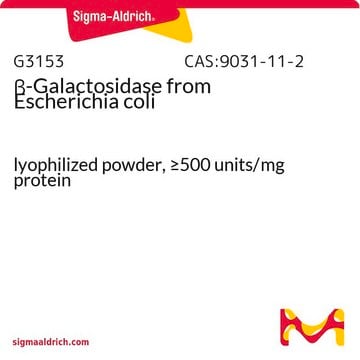G6637
β-Galactose Dehydrogenase from Pseudomonas fluorescens
recombinant, expressed in E. coli, ammonium sulfate suspension, ≥50 units/mg protein (biuret)
Synonym(s):
D-Galactose:NAD+ 1-oxidoreductase
Sign Into View Organizational & Contract Pricing
All Photos(1)
About This Item
Recommended Products
biological source
Pseudomonas fluorescens
Quality Level
recombinant
expressed in E. coli
Assay
0.5—2.0 mg protein/mL (biuret)
form
ammonium sulfate suspension
specific activity
≥50 units/mg protein (biuret)
color
white
suitability
suitable for enzyme test
application(s)
life science and biopharma
shipped in
wet ice
storage temp.
2-8°C
Gene Information
Pseudomonas fluorescens ... gdh(533113295)
Looking for similar products? Visit Product Comparison Guide
Application
β-Galactose Dehydrogenase from Pseudomonas fluorescens has been used for competitive inhibition in lectin histochemistry. It has also been used to measure the hydrolysis activity of Haloferax alicantei β-galactosidase on different disaccharides.
Biochem/physiol Actions
β-galactose dehydrogenase catalyzes the oxidation of β-D-galactose to D-galactono-gammalactone.
Unit Definition
One unit will convert 1.0 μmole of D-galactose to D-galactonate per min at pH 8.6 at 25 °C.
Physical form
Suspension in 3.2 M (NH4)2SO4, pH approx. 6.0
Storage Class Code
11 - Combustible Solids
WGK
WGK 3
Flash Point(F)
Not applicable
Flash Point(C)
Not applicable
Personal Protective Equipment
dust mask type N95 (US), Eyeshields, Gloves
Choose from one of the most recent versions:
Already Own This Product?
Find documentation for the products that you have recently purchased in the Document Library.
Customers Also Viewed
Takahiro Mieda et al.
Plant & cell physiology, 45(9), 1271-1279 (2004-10-29)
We have studied the enzymological properties of L-galactose dehydrogenase (l-GalDH), a key enzyme in the biosynthetic pathway of l-ascorbate (AsA) in plants. L-GalDH was purified approximately 560-fold from spinach leaves. The enzyme was a homodimer with a subunit mass of
Optimizing the enzymatic determination of galactose in the culture medium of rat liver and HepG2 cell spheroids.
Jinsheng Xu et al.
Analytical biochemistry, 311(2), 179-181 (2002-12-10)
Michael Sauer et al.
Applied and environmental microbiology, 70(10), 6086-6091 (2004-10-07)
Yeasts do not possess an endogenous biochemical pathway for the synthesis of vitamin C. However, incubated with l-galactose, L-galactono-1,4-lactone, or L-gulono-1,4-lactone intermediates from the plant or animal pathway leading to l-ascorbic acid, Saccharomyces cerevisiae and Zygosaccharomyces bailii cells accumulate the
H Pettersson et al.
Biochimica et biophysica acta, 1549(2), 155-160 (2001-11-03)
The mechanistic implications of the kinetic behaviour of a fusion protein of beta-galactosidase and galactose dehydrogenase have been analysed in view of predictions based on experimentally determined kinetic parameter values for the galactosidase and dehydrogenase activities of the protein. The
Jaeyoun Kang et al.
Parasite (Paris, France), 23, 21-21 (2016-05-14)
The localization of carbohydrate terminals in Kudoa septempunctata ST3-infected muscle of olive flounder (Paralichthys olivaceus) was investigated using lectin histochemistry to determine the types of carbohydrate sugar residues expressed in Kudoa spores. Twenty-one lectins were examined, i.e., N-acetylglucosamine (s-WGA, WGA
Our team of scientists has experience in all areas of research including Life Science, Material Science, Chemical Synthesis, Chromatography, Analytical and many others.
Contact Technical Service











